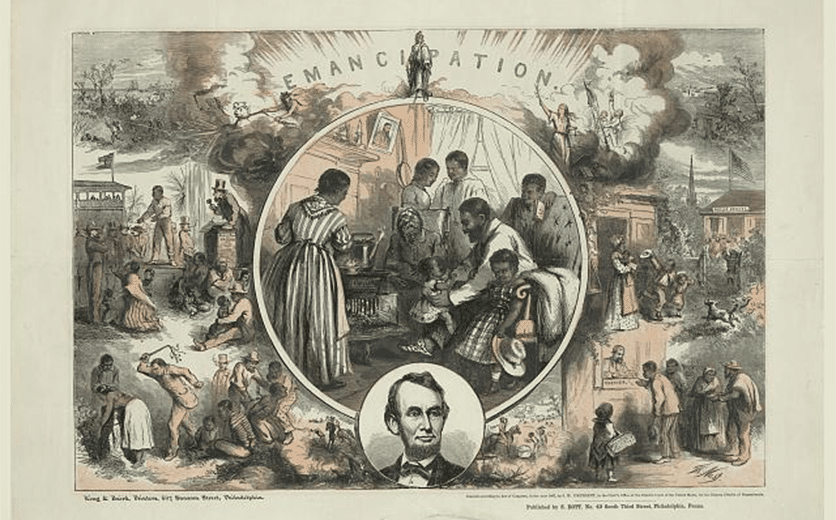Civil War Americans agreed on the moral authority of the Bible but disagreed about what the Bible said about slavery and the Emancipation Proclamation.
How did the Bible affect white Americans’ reactions to the Emancipation Proclamation?
Before the Civil War, a religious revival, the Second Great Awakening, swept the country. The revival brought an increase in religious fervor, which affected regions differently. Among white Southerners, the movement emphasized orthodoxy and inspired believers to read the Bible literally. In the North, the revivalism invigorated reform movements dedicated to bringing all of society closer to God’s kingdom of perfect love; anti-slavery was one such movement.
In the middle of the Civil War, on January 1, 1863, President Lincoln issued the Emancipation Proclamation, which used presidential war powers to declare an end to slavery in states that rebelled against the Union. This executive order marked an important step in the long battle to end slavery, and white Americans’ reactions reflected the regional split. Many white Southerners believed that slavery was part of the order willed by God. Antebellum sermons preached that slavery appears in the Bible from the Pentateuch through the New Testament without challenge from patriarchs, prophets, disciples, or Jesus himself. Some even claimed that enslavement taught obedience and piety. White Southerners repeated these claims throughout the Civil War, often citing Eph 6:5: “Slaves, obey your earthly masters.” In their opinion, Lincoln’s proclamation deserved contempt for counteracting God’s order.
White Northerners’ reactions to the proclamation were more mixed, but those who connected anti-slavery to the revival movement welcomed it. To them, the Civil War was punishment for not acting sooner. In the words of one Union soldier, “God allowed this war for the very purpose of clearing out the evil and punishing us as a nation for allowing it.” Sometimes troops likened emancipation to Scripture. For example, a soldier who was thankful “that the temple of slavery is doomed to fall, even though it be destroyed by poor blind Samson” drew on Judges 13–16. In this interpretation, Samson, the Israelite of great physical strength, was called to lead, much as many Americans believed the United States was called to lead, but Samson was enslaved and blinded by his enemies when he turned from God. Similarly, the United States had allowed itself to be blinded by the sin of slavery. Just as Samson later crushed his enemies by pulling their temple down on them, the Emancipation Proclamation helped the Union win the war by crushing slavery. The soldier reconciled himself to the “wail of wretchedness that is heard all over the South” by interpreting it, like a biblical prophet, as “the reward of their doings” (Hos 4:9).
How did the Bible affect black Americans’ reactions to the Emancipation Proclamation?
Some of the enslaved learned of the Proclamation from pocket-sized copies of the document distributed by Union soldiers in the South. More learned through word-of-mouth. Many black Americans interpreted the Emancipation Proclamation largely through the book of Exodus. Enslaved people identified with the ancient Israelites enslaved in Egypt. They hated slavery and had resisted the practice since the 1600s. The Emancipation Proclamation was a welcome support for this cause. Just as Moses told Pharaoh to let God’s people go, so, they argued, the Emancipation Proclamation told slaveholders to let God’s people go.
In days of slavery, the spiritual “Free At Last” anticipated emancipation with the line “Thank God Almighty I’m free at last.” In 1863, freedpeople viewed the Emancipation Proclamation as God’s instrument for ending slavery, but they clearly saw God and not the document as the source of their freedom.
Bibliography
- DuBois, W. E. B. Black Reconstruction in America 1860–1880. New York: Free Press, 1998.
- Masur, Louis P. Lincoln’s Hundred Days: The Emancipation Proclamation and the War for the Union. Cambridge: Harvard University Press, 2014.
- Noll, Mark. The Civil War as a Theological Crisis. Chapel Hill: University of North Carolina Press, 2015.





